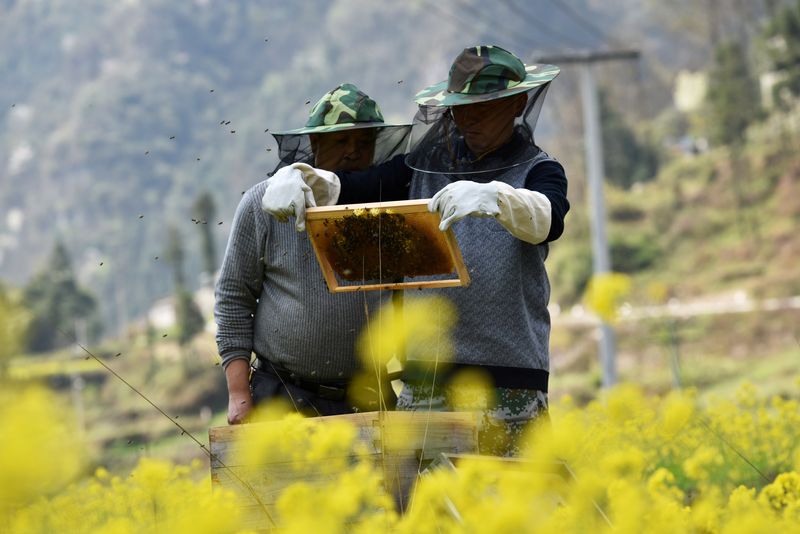By Hallie Gu and Shivani Singh
BEIJING (Reuters) - Beekeepers in China, the world's top honey producer, are bracing for a bleak start to the key spring pollinating season as travel curbs aimed at containing a coronavirus outbreak keep them at home while their bees go without food for weeks.
Jue, a beekeeper from Xinjiang in northwest China, said he has not slept for days, worrying about his 300 beehives that are stuck in wooden boxes about 200 miles from where he has been confined due to the curbs.
"I am really anxious," said Jue, who wanted to be identified only by his family name. "If all my bees die, I will lose my entire year's income," the 55-year-old nomadic beekeeper added.
Jue's pain is widely shared.
Bees missing the flowering phase of plants due to virus-related curbs, together with a drop in bee numbers, threatens to hurt the livelihood of China's 300,000 beekeepers as well as the output of honey and crops that rely on bees for pollination.
Acknowledging losses due to virus measures, the Apicultural Science Association of China has urged beekeepers to contact local authorities if they need to move or arrange feeding trips.
"You must not take your life, no matter what," it said after a beekeeper from China's southwestern Yunnan province, Liu Decheng, recently hanged himself.
China makes about 500,000 tonnes honey annually, or about a quarter of global output, making it the world's top producer.
It exports more than 100,000 tonnes to places like Europe and the United States.
(GRAPHIC - Honey output by top producers: https://fingfx.thomsonreuters.com/gfx/ce/7/8701/8682/HoneyProdbyCountry.png)
But the outlook for production is grim this year.
Normally, beekeeper Jue would be tending to his bee colonies now to prepare them to pollinate apricots in Turpan in March, before they go on a flower-chasing journey starting from pear orchards of Korla, the No.2 city of Xinjiang, in spring to Ruoqiang to collect nectar from the famous red dates in May.
Jue, however, said that this time he was running a "devastating" three weeks behind schedule.
"ALL BITTERNESS"
Like Jue, Zhang Miaoyan, from Jinhua in Zhejiang province south of Shanghai, is also struggling to reach her 120 cases of bees that have been starving for over 20 days.
"We beekeepers always say that we are in a bitter-sweet business. But this year, probably it is all bitterness," Zhang said, noting the virus had also put a dampener on sales during Lunar New Year period.
China's honey output has already been falling amid climate change, an ageing labor force and overuse of pesticides.
Jue, a 30-year veteran beekeeper, makes around 60,000–70,000 yuan ($9,982) in good years doing a job that entails driving in the evening and sleeping in a tent in barren places.
"None of the young people want to do this job. There is too much hardship," Jue said.
TOO LATE?
Beijing has asked local governments to minimize disruptions to transportation of animal feed and livestock, and specifically mentioned bees. But implementation has been slow amid the severity of the outbreak.
The flu-like virus can be transmitted from person to person, and has killed more than 2,700 people and infected about 80,000, mainly in China.
Jue is still trying to coordinate with the local government to rescue his bees, while Zhang got a go-ahead from local authorities over the weekend to save her beehives.
But it might be too late.
"Wild osmanthus here are in their prime time now. You can smell the sweetness," said Zhang.

"But the best flowering phase is passing now. Once you miss it, you can only wait for the next year," Zhang said.